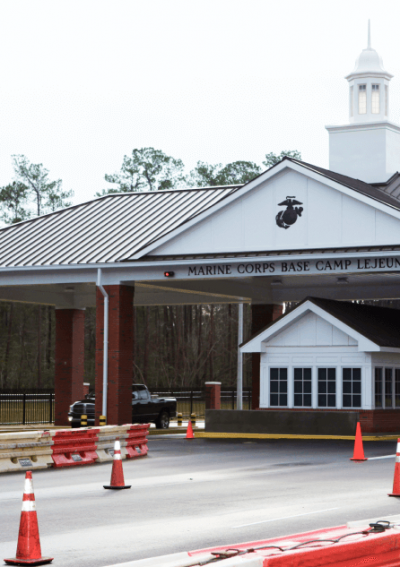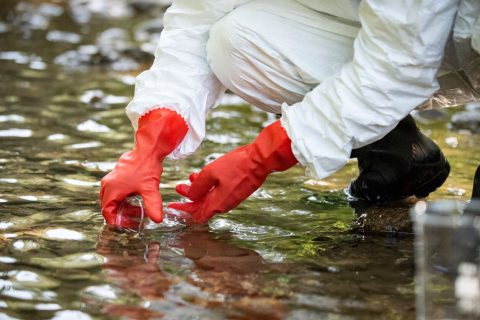Camp Lejeune Lawsuit
People who lived and/or worked at Camp Lejeune between 1953 and 1987 may file a Camp Lejeune lawsuit for exposure to contaminated water that led to cancer and other serious illnesses. These lawsuits seek compensation in addition to VA benefits or health care veterans are already entitled to.

Latest Updates on the Camp Lejeune Lawsuit
As of December 2023, there are about 1,419 Camp Lejeune lawsuits pending in the Eastern District of North Carolina.
Camp Lejeune lawsuits are still in the early stages, but new lawsuits continue to trickle in. Here are some of the latest Camp Lejeune lawsuit updates and key events in the litigation.
- July 2023: Judges appointed lead counsel to oversee the continued progress of the cases, including Weitz & Luxenberg's Robin Greenwald as co-lead counsel.
- March 2023: People who filed claims in August 2022 through JAG, the Judge Advocate General’s Corp., became eligible to file lawsuits in the Eastern District of North Carolina, prompting a spike in North Carolina claims. According to critics, the Navy and Marine Corps have denied responsibility and haven’t taken any action on more than 20,000 JAG claims.
- February 2023: About 20,000 Camp Lejeune administrative claims were filed through JAG.
- February 2023: More than 100 Camp Lejeune lawsuits were pending in the Eastern District of North Carolina.
- January 2023: People who filed claims with JAG in August 2022 and had not received a response became eligible to file a lawsuit in North Carolina under the CLJA.
- August 2022: Andrea Weiner becomes one of the first people to file a Camp Lejeune lawsuit in North Carolina.
- August 2022: President Joe Biden signed the PACT Act into law. This legislation included the Camp Lejeune Justice Act of 2022, which gives Camp Lejeune claimants the right to file a lawsuit for compensation for water contamination injuries.
The president signed the Camp Lejeune Justice Act of 2022 into law on Aug. 10, 2022, as part of the Honoring Our PACT Act of 2022. It originally passed the House and Senate on Aug. 2, 2022. According to the bill, it will “provide for recovery by individuals who were stationed, lived, or worked at Camp Lejeune, for certain actions of omissions by the United States.”
The Honoring Our PACT Act of 2022 “addresses health care, presumption of service-connection, research, resources, and other matters related to veterans who were exposed to toxic substances during military service.”
Why Are People Filing Camp Lejeune Lawsuits?
People who lived and worked at U.S. Marine Corps Base Camp Lejeune in North Carolina from 1953 to 1987 are filing Camp Lejeune lawsuits against the U.S. government for compensation because of cancer and other medical problems they developed after exposure to contaminated water at the base.
Camp Lejeune was established in 1942, and millions of soldiers, military personnel and civilians have lived and worked at the base. The Camp Lejeune Justice Act of 2022, or CLJA, allows individuals exposed to contaminated water at the base to file a Camp Lejeune lawsuit for compensation.
This page provides information on how to determine if you qualify to file a lawsuit, if filing a Camp Lejeune lawsuit will affect your VA benefits and how to find a Camp Lejeune lawyer.

History of Water Contamination at Camp Lejeune
In 1982, the government discovered that toxic chemicals had contaminated Camp Lejeune water treatment plants at Hadnot Point, Tarawa Terrace and Holcomb Boulevard. These water systems supplied the water people drank, cooked with and bathed in since the early 1950s.
This means Camp Lejeune water was contaminated for at least 30 years, and millions could have experienced health problems because of it. These chemicals are all very toxic and carcinogenic to humans.
- Trichloroethylene (TCE) – a solvent used for cleaning metal parts.
- Perchloroethylene (PCE) – used in dry cleaning and metal degreasing.
- Benzene – used to make plastics, resins, synthetic fibers and nylon.
- Vinyl chloride – created from TCE and PCE that degrade over time.
The contaminated wells were closed in 1985, but retired Marines, Navy personnel, any military veteran, civilian workers and their families could have been exposed to contaminated water and developed serious medical conditions such as neurological problems, cancer and other diseases.
Pregnant women exposed to the toxic water suffered miscarriages and gave birth to babies with birth defects.
Injuries Named in Camp Lejeune Lawsuits
Injuries named in Camp Lejeune water contamination lawsuits range from birth defects to cancer. Researchers at the Agency for Toxic Substances and Disease Registry studied people exposed to Camp Lejeune’s contaminated water as well as people in other groups exposed to the same chemicals to determine a link.
Because of the high level of contaminants in the water, people who lived and worked at the base for at least a month between Aug. 1, 1953, and Dec. 31, 1987, may develop a wide range of severe illnesses that have been included in lawsuits for compensation. People who were exposed in utero to contaminated water may also file claims.
- Acute myeloid leukemia
- Bladder cancer
- Brain cancer
- Breast cancer
- Central nervous system cancer
- Cervical cancer
- Colon cancer
- Esophageal cancer
- Hodgkin lymphoma
- Kidney cancer
- Laryngeal cancer
- Leukemia
- Liver cancer
- Lung cancer
- Myelodysplastic syndrome
- Multiple myeloma
- Non-Hodgkin lymphoma
- Oral cavity and pharyngeal cancer
- Ovarian cancer
- Prostate cancer
- Rectal cancer
- Thyroid cancer
- Cardiac defect
- Epilepsy
- Fatty liver disease (hepatic steatosis)
- Female Infertility
- Kidney damage
- Immune disorders
- Nerve damage
- Miscarriage
- Myelodysplastic syndromes (including aplastic anemia)
- Neurobehavioral effects
- Parkinson’s disease
- Renal toxicity/disease
- Scleroderma
As researchers publish more information about Camp Lejeune drinking water illnesses, this list could change.
Symptoms of Exposure to Camp Lejeune Water Contamination
The symptoms of exposure to Camp Lejeune water contamination will be different in each person depending on when they were exposed, how long they were exposed and how they were exposed. Some people might not experience symptoms for years.
Symptoms of exposure will also vary depending on the illnesses caused by the exposure. For example, someone who developed bladder cancer because of exposure to contaminated water would have the symptoms of bladder cancer, such as difficulty urinating or pain while urinating.
At the time of exposure, some people could have experienced headaches, nausea, skin irritation, fatigue, confusion or vomiting.
Do I Qualify to File a Camp Lejeune Lawsuit?
Anyone who lived or worked at Camp Lejeune for at least 30 cumulative days between August 1953 and December 1987 and developed one of the illnesses listed above may qualify to file a lawsuit. This includes veterans, reservists, guardsmen, civilian workers and family members.
Lawyers are also accepting cases from people who were in utero while their mothers were living or working at the base while the water was contaminated. Those in utero and children exposed to contaminated water were at especially high risk for health issues.
“Unfortunately, due to statutes of limitations and other legal barriers, [those affected by contaminated water at Camp Lejeune] have not been able to sue for their injuries and these injuries are devastating — we’re talking cancer, we’re talking death. Fortunately, the House and the Senate have passed legislation recognizing the serious need to achieve compensation.”
Under the CLJA, claimants must first file a Federal Tort Claims Act claim with the Department of the Navy. If the claim is denied or six months pass without a response from the Navy, the claimant is free to file their Camp Lejeune lawsuit in North Carolina. Your Camp Lejeune lawyer can help you through this process.
For example, in August 2022, Andrea Weiner filed a lawsuit in North Carolina against the U.S. government after she developed aplastic anemia from exposure to contaminated water at Camp Lejeune. She had filed a claim with JAG in May 2022 but it was denied.
VA Benefits for Veterans and Family Members
Veterans may file a Camp Lejeune lawsuit and still claim VA benefits. According to the VA, filing a lawsuit does not influence the VA’s decision to provide benefits or health care, nor does it affect the amount the VA will award. Make sure you discuss this with your Camp Lejeune lawyer or accredited VA service officer.
Veterans who served at Camp Lejeune or Marine Corps Air Station New River and their families who were on base for at least 30 cumulative days from August 1953 through December 1987 are eligible for benefits. However, the veteran must not have received a dishonorable discharge.
- Adult leukemia
- Aplastic anemia and other myelodysplastic syndromes
- Bladder cancer
- Kidney cancer
- Liver cancer
- Multiple myeloma
- Non-Hodgkin lymphoma
- Parkinson’s disease
In order to get disability benefits, veterans must file a claim for disability and provide medical records showing a diagnosis of one or more of the conditions listed above.
- Bladder cancer
- Breast cancer
- Esophageal cancer
- Female infertility
- Hepatic steatosis
- Kidney cancer
- Leukemia
- Lung cancer
- Miscarriage
- Multiple myeloma
- Myelodysplastic syndromes
- Neurobehavioral effects
- Non-Hodgkin lymphoma
- Renal toxicity
- Scleroderma
The VA will pay for out-of-pocket costs related to any of the conditions listed above for veterans and families. Like veterans, family members will have to file a claim for compensation and include medical records as well as proof of living on base at Camp Lejeune or MCAS New River for at least 30 days from August 1953 through December 1987.
In addition, they will need evidence of paid health expenses related to one of the health conditions listed above. It’s not required, but the claimant’s treating physician can fill out VA Form 10-10068b to help determine eligibility.
Camp Lejeune Water Contamination Settlement Amounts
Some experts have estimated the minimum Camp Lejeune settlement could be $10 million, and the Congressional Budget Office estimated that these claims could cost the government more than $163 billion over 10 years. So far, there haven’t been any publicly announced settlement amounts for Camp Lejeune water contamination lawsuits. Without any bellwether test trial verdicts, it’s difficult to estimate an average Camp Lejeune settlement amount, and that amount could be more or less depending on the injuries claimed.
Veterans approved by the VA for a Camp Lejeune disability claim with a 100% rating may get an average of $3,000, according to some lawyers. VA disability compensation varies depending on the disability rating and isn’t a part of any Camp Lejeune lawsuit claim. Veterans with denied claims can seek help from an accredited veterans service officer or hire a VA-accredited lawyer to help them appeal their case.
How a Camp Lejeune Lawyer Can Help You
When choosing a Camp Lejeune lawyer, it’s important to look for experience and a proven track record in environmental law and toxic torts. Lawyers who have experience dealing with chemical spills, groundwater contamination and other environmental mass torts have the knowledge it takes to fight for you.
For example, Consumer Notice partners with the award-winning national law firm Weitz & Luxenberg. W&L has obtained millions of dollars for people affected by water contamination in Petersburgh and Hoosick Falls, New York. The firm also obtained a $423 million settlement against big oil companies in lawsuits where drinking water was contaminated with toxic chemicals from the gasoline additive MTBE.
“Our law firm believes that you deserve compensation for your suffering, especially because you became sick while you and your family members were serving our country. We are going to fight on your behalf to get you the full compensation you deserve,” said Robin Greenwald, a partner at W&L and co-chair of the firm’s Environmental Toxic Torts and Consumer Protection Litigation group.
When looking for a Camp Lejeune lawsuit lawyer, you may have to interview more than one firm. But once you hire a firm, they can walk you through the process of filing a lawsuit. This includes filing a claim with JAG to get the lawsuit process going. Then, they will help you file a claim in North Carolina and gather all the evidence you need to prove your case. Finally, they will negotiate a settlement or fight for a jury verdict in court.
19 Cited Research Articles
Consumernotice.org adheres to the highest ethical standards for content production and references only credible sources of information, including government reports, interviews with experts, highly regarded nonprofit organizations, peer-reviewed journals, court records and academic organizations. You can learn more about our dedication to relevance, accuracy and transparency by reading our editorial policy.
- In RE: Camp Lejeune Water Litigation. (2023, July 19). Order. Retrieved from https://www.nced.uscourts.gov/pdfs/FiledOrder-07-19-2023.pdf
- Magner, M. (2023, March 23). Camp Lejeune health claims are mired despite law allowing suits. Retrieved from https://rollcall.com/2023/03/23/camp-lejeune-health-claims-are-mired-despite-law-allowing-suits/
- Jones, D.N. (2023, February 13). More than 100 lawsuits filed in U.S. court over Camp Lejeune water after waiting period passes. Retrieved from https://www.reuters.com/legal/litigation/more-than-100-lawsuits-filed-us-court-over-camp-lejeune-water-after-waiting-2023-02-14/
- Andrea Weiner f/k/a Andrea Michele Byron v. The United States of America. (2022, August 11). Complaint, Jury Trial Demanded. Retrieved from https://www.aboutlawsuits.com/wp-content/uploads/2022-08-11-Weiner-Complaint.pdf
- White House. (2022, August 10). FACT SHEET: President Biden Signs the PACT Act and Delivers on His Promise to America’s Veterans. Retrieved from https://www.whitehouse.gov/briefing-room/statements-releases/2022/08/10/fact-sheet-president-biden-signs-the-pact-act-and-delivers-on-his-promise-to-americas-veterans/
- U.S. Department of Veterans Affairs. (2022, March 7). Camp Lejeune water contamination health issues. Retrieved from https://www.va.gov/disability/eligibility/hazardous-materials-exposure/camp-lejeune-water-contamination/
- U.S. Congressman Gregory F. Murphy, M.D. (2022, March 3). Murphy Applauds Passage of Camp Lejeune Justice Act. Retrieved from https://gregmurphy.house.gov/media/press-releases/murphy-applauds-passage-camp-lejeune-justice-act
- Udasin, S. (2022, March 3). Camp Lejeune toxic water victims eye justice as pivotal House bill passes. Retrieved from https://thehill.com/policy/equilibrium-sustainability/596723-camp-lejeune-toxic-water-victims-eye-justice-as-pivotal/
- Agency for Toxic Substances and Disease Registry. (2020, July 29). Camp Lejeune, North Carolina: Public Health Activities. Retrieved from https://www.atsdr.cdc.gov/sites/lejeune/activities.html
- Agency for Toxic Substances and Disease Registry. (2019, September 25). Camp Lejeune, North Carolina. Retrieved from https://www.atsdr.cdc.gov/sites/lejeune/index.html
- Federal Register. (2017, January 13). Diseases Associated With Exposure to Contaminants in the Water Supply at Camp Lejeune. Retrieved from https://www.federalregister.gov/documents/2017/01/13/2017-00499/diseases-associated-with-exposure-to-contaminants-in-the-water-supply-at-camp-lejeune
- Agency for Toxic Substances and Disease Registry. (2014, January 16). Camp Lejeune, North Carolina: Background. Retrieved from https://www.atsdr.cdc.gov/sites/lejeune/background.html
- Agency for Toxic Substances and Disease Registry. (2014, January 16). Camp Lejeune, North Carolina: Health effects linked with trichloroethylene (TCE), tetrachloroethylene (PCE), benzene, and vinyl chloride exposure. Retrieved from https://www.atsdr.cdc.gov/sites/lejeune/tce_pce.html
- Agency for Toxic Substances and Disease Registry. (2014, January 16). Chemicals at Camp Lejeune (FAQs). Retrieved from https://www.atsdr.cdc.gov/sites/lejeune/faq_chemicals.html
- National Research Council (US) Committee on Contaminated Drinking Water at Camp Lejeune. (2009). Contaminated Water Supplies at Camp Lejeune: Assessing Potential Health Effects. Retrieved from https://www.ncbi.nlm.nih.gov/books/NBK215286/
- U.S. Marine Corps. (2007, October 24). Update on Camp Lejeune Water Study. Retrieved from https://clnr.hqi.usmc.mil/clwater/pages/articles/pr_6-13-07.aspx
- U.S. Department of Veterans Affairs. (n.d.). Camp Lejeune: Past Water Contamination. Retrieved from https://www.publichealth.va.gov/exposures/camp-lejeune/
- U.S. Marine Corps. (n.d.). Camp Lejeune Historic Drinking Water. Retrieved from https://clnr.hqi.usmc.mil/
- U.S. Department of Veterans Affairs. (n.d.). Camp Lejeune Water Contamination: Know Your Options. Retrieved from https://www.va.gov/files/2022-12/Camp%20Lejeune%20FAQ%20V12.6.22%201030hrs.pdf
Calling this number connects you with a Consumer Notice, LLC representative. We will direct you to one of our trusted legal partners for a free case review.
Consumer Notice, LLC's trusted legal partners support the organization's mission to keep people safe from dangerous drugs and medical devices. For more information, visit our partners page.
844-526-0648


